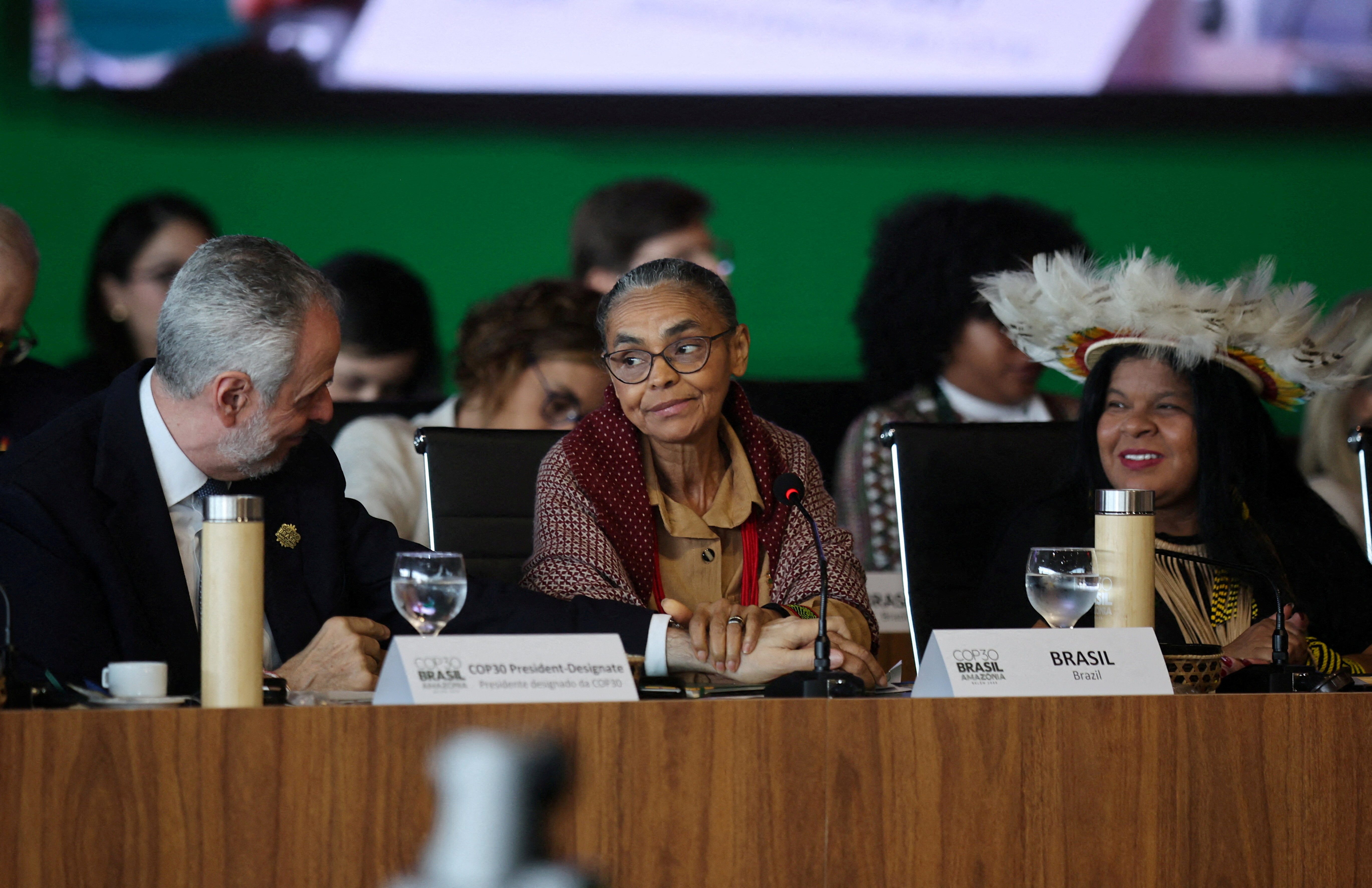This year set to be hottest ever recorded, and other nature and climate stories you need to read this week

Top nature and climate news: people keep cool as 2023 set to be hottest year on record, and more.
Image: REUTERS/Remo Casilli
- This weekly round-up contains key nature and climate news from the past week.
- Top nature and climate stories: 2023 set to be hottest year ever; 2 million species facing extinction; Earth's remaining CO2 emissions budget could soon disappear.
1. This year set to be hottest ever recorded, say scientists
With average annual temperatures threatening the Paris Agreement's 1.5°C climate target, 2023 looks almost certain to become the hottest year on record, scientists say.
Global average temperatures for January-October were the highest since records began.
Extreme heat in October sent average annual temperatures soaring. The month was 1.7°C warmer than an estimate of average October temperatures for the pre-industrial period of 1850-1900, against which Paris Agreement targets are set.
"October 2023 has seen exceptional temperature anomalies, following on from four months of global temperature records being obliterated," says the Copernicus Climate Change Service's Deputy Director, Samantha Burgess. "We can say with near certainty that 2023 will be the warmest year on record, and is currently 1.43ºC above the preindustrial average. The sense of urgency for ambitious climate action going into COP28 has never been higher.”
Globally, October 2023 was the warmest October ever recorded, with surface air temperatures averaging 15.30°C. That is 0.85°C warmer than the previous record set in 2019, according to Copernicus Climate Change Service.
2. Two million species facing extinction, new estimate says
Two million species of vertebrates, plants and insects could disappear from the planet, according to new research on biodiversity loss.
The paper, published in Plos One, says that twice as many species face the risk of extinction than forecast by the United Nations back in 2019.
Monitoring endangered species of plants and vertebrates is comparatively easier than for insects. The UN previously made a "tentative estimate" of 10% of insect species being under threat, but this underestimated the extent of biodiversity loss by half, the new paper suggests.
Researchers analyzed all European species on the International Union for Conservation of Nature's endangered list. The findings show that one-fifth of all European species could face extinction, including 24% of invertebrates, 27% of plants and 18% of vertebrates.
“What our study does is really highlight that insects are as threatened as other taxa. And because they are the most species-rich group of animals on our planet, this is really something which should be addressed," lead researcher Axel Hochkirch from the Musée National d’Histoire Naturelle in Luxembourg told UK newspaper The Guardian.
Insects are vital to the survival of the planet's ecosystems as they pollinate crops, control pests, recycle nutrients and maintain healthy soil.
What is the World Economic Forum doing about nature?
3. News in brief: Other top nature and climate stories this week
Earth's remaining CO2 emissions budget could soon disappear, as worldwide fossil fuel production in 2030 is set to double levels consistent with Paris Agreement climate targets, according to a new report by the UN Environment Programme.
Forests in the UK could face "catastrophic ecosystem collapse" within 50 years due to the climate crisis, unless urgent action is taken to make them more resilient, warns a new joint study from Forestry England and the University of Cambridge.
The world's most polluted capital city, New Delhi in India, plans to make rain using cloud seeding to improve air quality. Heavy smog this week has resulted in schools closing, construction work halting and plans to restrict vehicle use.
The US and China have reached "understandings and agreements" on the climate crisis ahead of the upcoming COP28 climate talks in the United Arab Emirates, US climate envoy John Kerry announced.
Accept our marketing cookies to access this content.
These cookies are currently disabled in your browser.
"Once-in-a-century" flooding has displaced hundreds of thousands of people in Somalia and neighbouring countries. The flood – which follows a period of extreme drought – could impact 1.6 million people in Somalia, the UN Office for the Coordination of Humanitarian Affairs says.
Amazon deforestation in Colombia is forecast to have dropped by 70% in the first nine months of 2023, according to Environment Minister Susana Muhamad. However, drought could cause a spike in tree loss in the final months of the year, she warned.
Record-low water levels are highly possible at Lake Titicaca on the Peru-Bolivia border, amid high-than-usual temperatures and severe drought due to El Nino. Water levels are expected to fall further, Peru's national meteorology and hydrology service Senamhi reports.
4. More on the nature and climate crisis on Agenda
Ecological restoration is a fledgling industry in many Amazonian nations, but establishing a bioeconomy cluster could help assure large-scale environmental restoration projects in the region.
In less than 15 years, 14% of the planet's coral reefs have disappeared. But the Coral Reef Breakthrough is calling for $12 billion of public and private investment to protect and conserve our remaining reef ecosystems.
Prince William's Earthshot Prize helps early-stage, sustainability-focused start-ups reach scale. Here are 2023's five £1 million winning contributions to efforts to embrace a more sustainable future for the planet.
Related topics:
More on Nature and BiodiversitySee all
Andrea Willige
November 10, 2025
Marco Lambertini and Marcelo Bicalho Behar
November 6, 2025
Tom Crowfoot
November 5, 2025
Laura Fisher, David Mueller and Anika Duggal
November 5, 2025




